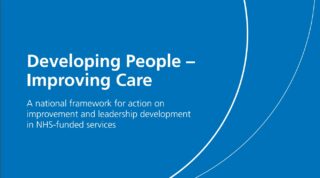 Today has seen the publication of Developing People – Improving Care – a welcome statement of ambition from national bodies to bring leadership and improvement together, and to bring coherence and quality to both. It’s a document that I and my Health Foundation colleagues have read with great interest. We have long championed and invested in improvement and leadership capability – work you can read more about on our website – and for some time we’ve been calling for a coherent approach to improving quality and for more attention from national bodies to providing support for improvement.
Today has seen the publication of Developing People – Improving Care – a welcome statement of ambition from national bodies to bring leadership and improvement together, and to bring coherence and quality to both. It’s a document that I and my Health Foundation colleagues have read with great interest. We have long championed and invested in improvement and leadership capability – work you can read more about on our website – and for some time we’ve been calling for a coherent approach to improving quality and for more attention from national bodies to providing support for improvement.
a welcome statement of ambition from national bodies to bring leadership and improvement together
The new framework offers a rare opportunity to focus the national spotlight away from individual initiatives and regulatory interventions onto the critical and often neglected factors in improvement that are frequently relegated to catch-all categories such as ‘culture’, ‘capacity and capability’, or ‘context’. These factors include values and behaviours, strengthening organisational structures that enable improvement, attention to the growth and development of staff, and giving them the support to solve problems and improve the processes in which they work.
The national bodies pledge an iterative process to develop the framework over time, promising to draw on feedback from people across the service. With action proposed across a wide range of fronts, what might be some active ingredients in turning vision into reality? Based on our learning from working with leaders and improvers, we would suggest:
Sustained attention to organisational context, relational and personal leadership, alongside technical methods
While the emphasis on improvement methods and measurement (and their incorporation in leadership development and professional curricula) is very welcome, the experience of our grant holders and fellows is that leading improvement is a demanding art, requiring technical methods set within a supportive organisational approach that puts quality improvement at its heart.
Our fellowships such as GenerationQ consciously place as much weight on relational skills and personal leadership qualities as they do on technical methods. Curricula should therefore also seek to encourage the ‘habits of improvers’ such as questioning, problem-seeking, reflection, risk-taking and managing uncertainty.
Systematically building in ‘time and space’ for design and testing at all levels
While many call for ‘time and space’, what does this mean in practice? Leaders of teams, organisations and systems need to provide opportunities for frontline professionals to work together on redesigning care. This could be a brief, regular time built in to the working day for a clinical team to come together, such as a huddle, or a facilitated space for clinical teams and patients to collaborate on redesigning services, such as the ‘big rooms’ in our Improving Flow programme in Sheffield, Warwick and Bath.
For complex problems beyond the control of individual teams and organisations, new forums may be needed. We will be experimenting in 2017 with the piloting of the first Q Lab, a structured, facilitated approach for working on complex problems.
Developing programmes, resources and systems for improvement
As the framework points out, many NHS organisations rated ‘outstanding’ by the Care Quality Commission (like East London, Salford Royal and Western Sussex foundation trusts) have embraced continuous quality improvement over time as their core business strategy.
As Professors Mary Dixon-Woods and Graham Martin have argued, as well as supporting improvement in individual projects and organisations, health care also needs to establish systems for learning across organisations: we need to make it much easier to connect people and mobilise knowledge between organisations and between peers, as well as up and down hierarchies. At an individual level, communities such as Q allow peers to share tacit knowledge and practical wisdom to complement explicit, published descriptions of improvement work.
But for me, perhaps most eye-catching of all are the pledges to ‘model in all our dealings with the service…inclusive, compassionate leadership and attention to people development’ and that the national bodies ‘owe local organisations and systems time and space to establish continuous improvement cultures’.
There is no doubt that this work of providing enabling, supportive and aligned regulation and oversight will be critical for creating an environment where improvements to care can be made.
So can national bodies’ actions meet this bold stated intent?
As the document itself acknowledges, it’s easy to formulate a sceptical response. NHS management and regulatory culture is more commonly associated with the hierarchical, command-and-control language of ‘grip’, ‘scale and pace’ and ‘comply or explain’, than with the ‘listening with fascination’ that the framework describes. And with no new investment, and cuts to the budget of key bodies charged with implementation (such as Health Education England), the odds against such a cultural sea-change look forbidding.
But in this case the easy response might be the wrong one. When the leadership of the NHS makes a promise of a more enabling and supportive approach, there is a middle ground response between the extremes of outright cynicism and unquestioning acceptance. If the NHS is to progress towards becoming a system dedicated to continuous learning and improvement, then the framework offers a step in the right direction.
Will is Director of Improvement at the Health Foundation, www.twitter.com/will_warburton2